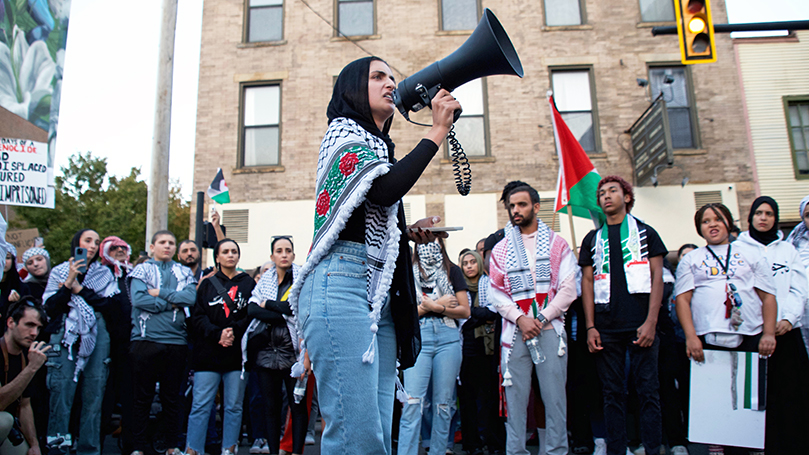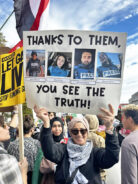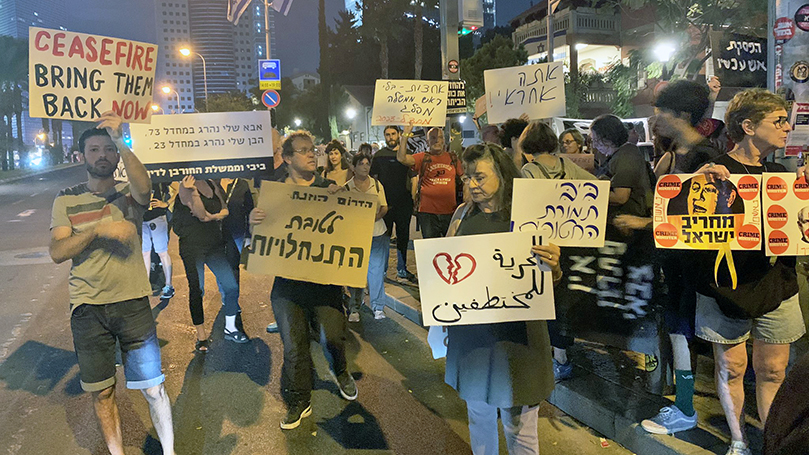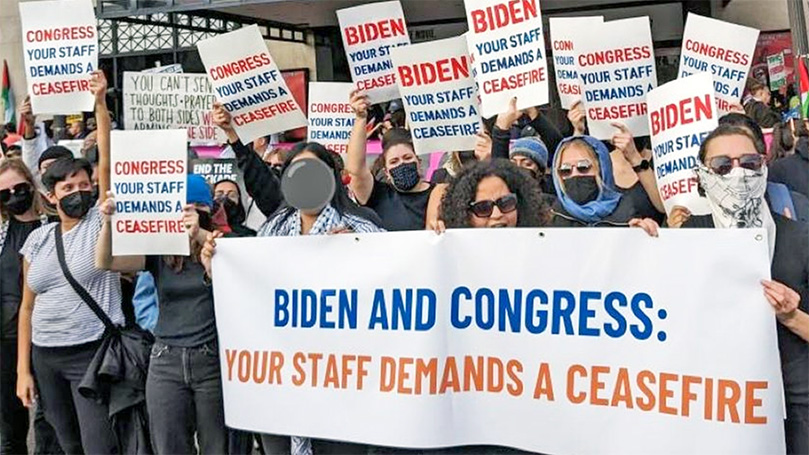
Twenty years ago, those in the Palestine solidarity movement could only dream of the mass resistance we see today in the streets of the United States against the Israeli government’s occupation and apartheid system. The Second Intifada (2000-2005) shared most of its timeline with the “Global War on Terrorism” rampage after 9/11, when Islamophobia in the U.S. was at an all-time high. Activists who spoke out about the Israeli government’s brutal and racist war against the Palestinian people were flagged by the FBI, blacklisted, interrogated, raided, and even imprisoned.
International volunteers to Palestine were thoroughly screened beforehand. Before the years of social media ubiquity, such volunteers kept a low profile to pass Israeli border control and more easily gain access to the country. Sometimes, activists had to work clandestinely. They didn’t do this out of fear, so much as it was a necessity for effective organizing. One wrong answer to an Israeli soldier could earn you a red stamp in your passport, deportation orders, and a ban from entering the country. The Second Intifada got wrapped up in the “War on Terror” so thoroughly that when Rachel Corrie, a young activist from Washington, was crushed by a bulldozer blocking the demolition of a doctor’s home in Gaza, her death was almost immediately forgotten by the media because of the United States’s criminal invasion and destruction of Iraq just three days later.
The international solidarity movement yielded great gains for the Palestinian cause. Slowly, activists began to organize openly on campuses, forming into chapters of Students for Justice in Palestine. The Boycott, Divestment, and Sanctions (BDS) movement opened a public front against Israeli occupation and apartheid. Groups like Jewish Voice for Peace grew, and other organizations like If Not Now were established, drawing thousands of young U.S. Jews into the fight against the oppression of Palestinians. The internet, so limited and slow during the Second Intifada, became a new venue for organizing and education.
It also became the venue for more vicious and sustained attacks against the Palestinian solidarity movement. Websites like the Canary Mission began to compile dossiers on U.S. activists, mainly students and professors, to publish online and sabotage prospects of employment. Social media posts made in solidarity with Palestine were circulated by organizations defending Israel’s far-right government and resulted in professionals losing their jobs.
Today — with hell raining down on Gaza, the West Bank, and Jerusalem — students, labor leaders, and activists in the United States are again being threatened, censured, and fired because of what they say in public about the genocidal war on the Palestinian people. It is hard to stay silent while the media shows civilians, many of them children, killed by Israeli bombs dropped by U.S.-made F-16s. Firing or blacklisting those who speak up not only causes damage to these people’s lives, but also causes a chilling effect in the movement. It threatens an unspoken assumption, as it was during the second intifada, that being publicly outspoken against apartheid in Palestine will result in societal ostracization.
However, it is useful to examine this domestic backlash in context of what’s now occurring in Palestine and Israel.
 In places like Gaza, the West Bank, and Jerusalem, speaking up can be a death sentence. Since October 7th, 31 journalists have been brutally killed in Gaza, with nine still missing. There are none to replace them, as the Israeli military has refused entry to all journalists to Gaza. The Israeli government has cut off not just all food and water to Gaza, but also fuel and telecom capacity, meaning that the few photos and videos to break through this digital blockade are precious and rare. Six journalists have been arrested by the Israeli military in the West Bank, where Palestinian social media is heavily monitored and cause for routine arrests by either the Palestinian Authority (PA) or the Israeli military. As settlers continue their violent pogroms against Palestinians in the West Bank, the Israeli government has cut all funds to the PA, meaning that hundreds of thousands of Palestinians will not be receiving their paychecks. They say that this is because the PA refused to denounce the attacks of 10/7, though a more practical reason might be to sow more disunity, confusion, and upheaval in the West Bank while the IDF is busy in Gaza and the PA struggles to contain the popular outrage against the Israeli war on Gaza.
In places like Gaza, the West Bank, and Jerusalem, speaking up can be a death sentence. Since October 7th, 31 journalists have been brutally killed in Gaza, with nine still missing. There are none to replace them, as the Israeli military has refused entry to all journalists to Gaza. The Israeli government has cut off not just all food and water to Gaza, but also fuel and telecom capacity, meaning that the few photos and videos to break through this digital blockade are precious and rare. Six journalists have been arrested by the Israeli military in the West Bank, where Palestinian social media is heavily monitored and cause for routine arrests by either the Palestinian Authority (PA) or the Israeli military. As settlers continue their violent pogroms against Palestinians in the West Bank, the Israeli government has cut all funds to the PA, meaning that hundreds of thousands of Palestinians will not be receiving their paychecks. They say that this is because the PA refused to denounce the attacks of 10/7, though a more practical reason might be to sow more disunity, confusion, and upheaval in the West Bank while the IDF is busy in Gaza and the PA struggles to contain the popular outrage against the Israeli war on Gaza.
In Israel, at least 80 Palestinian citizens of Israel have been arrested since October 7th for their activity on social media. Israeli chief of police Kobi Shatai stated that “anyone inciting against the State of Israel, its government symbols, elected officials, military personnel and police, should be aware that the Israel Police will respond firmly and without leniency.” Among those jailed are media figures and a former mayoral candidate.
All protests against the ongoing slaughter in Gaza have been banned in Israel. Police told a business in Haifa that if it hosted a conference between Jewish and Palestinian citizens of Israel for peace, it would be closed. The Israeli war cabinet is poised to pass a bill to authorize the use of live ammunition on protesters seeking to block roads.
Additionally, Jewish political leaders and journalists in Israel have also been arrested and attacked, including peace activists. Ofer Cassif, a Jewish MP, a leader of the left political coalition Hadash, and a member of the Israeli Communist Party (Maki), was banned from participating in the Knesset for 45 days. This was because he spoke out against the Israeli government and its role in fomenting the current iteration of conflict to an international audience. Israel Fry, a journalist, was driven into hiding after hundreds of right-wing Israelis descended on his house in Bnei Brak, outside of Tel Aviv, because he made a public prayer for both the children of Gaza and of Israel.
As elected officials and university presidents across the United States express concern that pro-Palestine protests make Jewish students uncomfortable on campus, dozens of Palestinian students at the University of Netanya were barricaded inside of a dorm hall while hundreds of right-wing Israelis chanted “Death to the Arabs” and attempted to light the building on fire. Though the police dispersed the riot, no arrests were made.
The fear, anxiety, anguish, and righteous anger of the moment can be overwhelming. But it’s important to understand what the harsh crackdown on democratic discussion, and even the suppression of basic facts about the conflict, is all about. It is in response to growing opposition globally and in the U.S. to the brutal slaughter in Gaza. It is also connected to growing opposition within Israel to their own government, which the Communist Party of Israel recently characterized as fascist.
From January to October of this year, Israel was embroiled in the largest protests its civil society had ever produced. The far-right Israeli government, led by Benjamin Netanyahu’s Likud party, pushed a so-called judicial reform package through the Knesset, effectively handing power to the extreme right elements in Israel to unilaterally change laws as they see fit without judicial oversight. Many hundreds of thousands of Israelis went into the streets to demand an end to the government. Some advanced sections of this protest movement correctly connected the increasingly fascistic actions of the Israeli government to the fascistic terror meted out to the Palestinian people. They demanded an end to the occupation and to the apartheid system.

While these protests grew in outrage and size, settler violence and terror simultaneously reached a sickening crescendo in the West Bank, illustrating the clearly divided nature of Israeli civil society. These attacks were carried out by vigilantes who were protected by the Israeli army. Described as pogroms, dozens of settlers descended on smaller cities and villages like Huwarra, burning Palestinian property, destroying olive orchards, and lynching Palestinians. With the massive Israeli security apparatus invested in both suppressing protests across Israel and personally escorting settler-terrorists on their rampages, Hamas militants met little resistance in their attacks launched against Israeli military positions and civilian areas in the south on October 7th.
Many in Israel are now demanding answers as to why the Israeli security forces failed to protect the public on Oct. 7. While protests against the war are now banned, a growing number of people in Israel are demanding the more than 200 hostages’ safe return be prioritized, and not a military campaign in Gaza. Many of these families are clearly sympathetic to the humanitarian catastrophe in Gaza, but more immediately, are concerned that the Israeli government is not actively seeking a way to return the hostages to their families. If all of Gaza is cut off from food, water, medicine, fuel, and communications, then so, too, are their families. If all of Gaza is subject to genocidal bombing campaigns, with whole families being annihilated by one bomb, their family members are also subject to such violence. Hamas sources claim that at least 60 hostages have died by such bombardment since October 7th. Families of the hostages support releasing all Palestinian prisoners in exchange for the return of their own loved ones, and demand a stop to the bombing, and to the ground invasion in Gaza, until a deal is made.
When Gilad Shalit, an Israeli officer, was taken hostage in 2006, Israel released 1,027 Palestinian prisoners in exchange. There have been no public efforts from the Israeli government to return the hostages this time, simply a demand that they all be released immediately. Hamas unilaterally released two American-Israeli women as a humanitarian gesture, but when they tried to release two more hostages this past Friday, Hamas claimed that such a release was refused by Israel. One of the hostages, Yocheved Lifshitz, is the 85-year-old wife of Haaretz journalist Oded Lifshitz. The couple were known to be sympathetic to the Palestinians trapped in Gaza, working as volunteers to drive patients who had received permission from the occupation government to seek medical treatment in Israel. These two elderly women have since been released.
The families of the hostages have been outspoken in their anguish and present a challenge to the Israeli government by their very existence. When allowed to meet with Benjamin Netanyahu, they were suddenly joined by a right-wing provocateur who disrupted the meeting by saying he trusted Netanyahu completely and pushing pro-war talking points. Ha’aretz reported that this man has ties to the Netanyahu family, but no actual connection to the hostages. In fact, he had helped organize demonstrations against families holding vigils outside of the Israeli military headquarters in Tel Aviv.
Across the world, protests are being banned and harshly cracked down on by governments in support of Israel. In Germany, France, Austria, Hungary, and Switzerland, protests went ahead despite those governments explicitly forbidding them. In the United Kingdom, efforts were also made by the government to stamp out protests. A transportation worker who led pro-Palestine chants of “Free, free Palestine!” has been suspended. Yet, the protests continue and gain in their size and strength.
In the United States, the pushback has been tremendous despite these efforts to repress popular sentiment. Hundreds and hundreds of Jewish people in the U.S. have been arrested in mass civil disobedience actions while thousands shut down the Brooklyn Bridge.

The repression of the peace movement at home, and unqualified support for a fascist government in Israel, greatly increases the fascist danger in the U.S. itself. Political scholars and activists are raising the alarm that Biden’s policy with respect to Israel threatens to hand the 2024 election to the GOP. Large numbers of Arab and Muslim voters helped defeat Trump in key swing states like Virginia and Michigan. At the same time, young progressives — particularly those who participated in the massive Black Lives Matter protests in the summer of 2020 and then marched from the streets to the polls that November — increasingly see their struggles against racism in the U.S. as being linked to the struggle against occupation and apartheid in Palestine and Israel. Indeed, the gathering strength of the Black Lives Matter movement in the United States signaled a turnaround in public opinion on Palestine.
Attempting to stifle popular sentiment regarding the human desire for peace and dignity can only lead, in the long term, to the common ruin of both the capitalists and imperialists now gorging themselves on profits, and the rest of us. Left with no options to democratically express themselves, human beings will resort to desperate and even violent acts of resistance, though we don’t condone it. If young voters in the United States do not feel like their wishes are being respected, they will lose hope in the ballot box. This will be an unmitigated disaster for the working class in the United States, Palestine, and even in Israel. The extreme-right elements running against Biden are no friends of the Palestinian liberation struggle. Trump himself moved the U.S. Embassy from Tel Aviv to Jerusalem, and all of Biden’s contenders take money from the largest pro-Israel organizations in the United States — organizations which are Christian, not Jewish.
Joe Biden was elected on the promise that he would act as a bulwark against the extreme right, both in the streets and in our workplaces. Many of his voters are expecting him to also act as a bulwark against the extreme right on an international scale. Using far-right governments in other countries to funnel billions of dollars into U.S. arms corporations each year accomplishes just the opposite.
If Biden and his staff are sincere about the stakes of the 2024 election, then all the progressives in his administration and all progressive groups in his orbit need to intervene immediately on this increasingly serious issue. Joe Biden is not one man, he is supported by staff and advisors who are, themselves, increasingly sympathetic to Palestine. Importantly, many Capitol Hill staffers have joined the movement for a ceasefire, including nearly 400 former Bernie Sanders staffers and hundreds of other staffers on Capitol Hill — including some of those on Biden’s team. All this is and more is needed to force the administration to end its support for the ethnic cleansing taking place in Palestine. Even if Joe Biden doesn’t want to call for a ceasefire, the people he is depending on to knock on doors to get him elected need him to, so that they can turn out the hundreds of thousands of Arab, Muslim, youth and progressive voters that will be necessary to defeating the MAGA right next year.
For more information about the Netanyahu government’s efforts to stamp out the peace movement in Israel, listen to the International Department’s recent interview with MK Dr. Ofer Cassif.
Images: CPUSA, OH District; Ceasefire activist in DC honors journalists in Gaza by Sharmin Hossain (Twitter); Israelis in Tel Aviv protesting for an immediate ceasefire and release of hostages by Haggai Matar (Twitter); Congressional and Biden staffers join pro-Palestine Nov. 4 march in D.C. by dear_white_staffers (Instagram)


 Join Now
Join Now